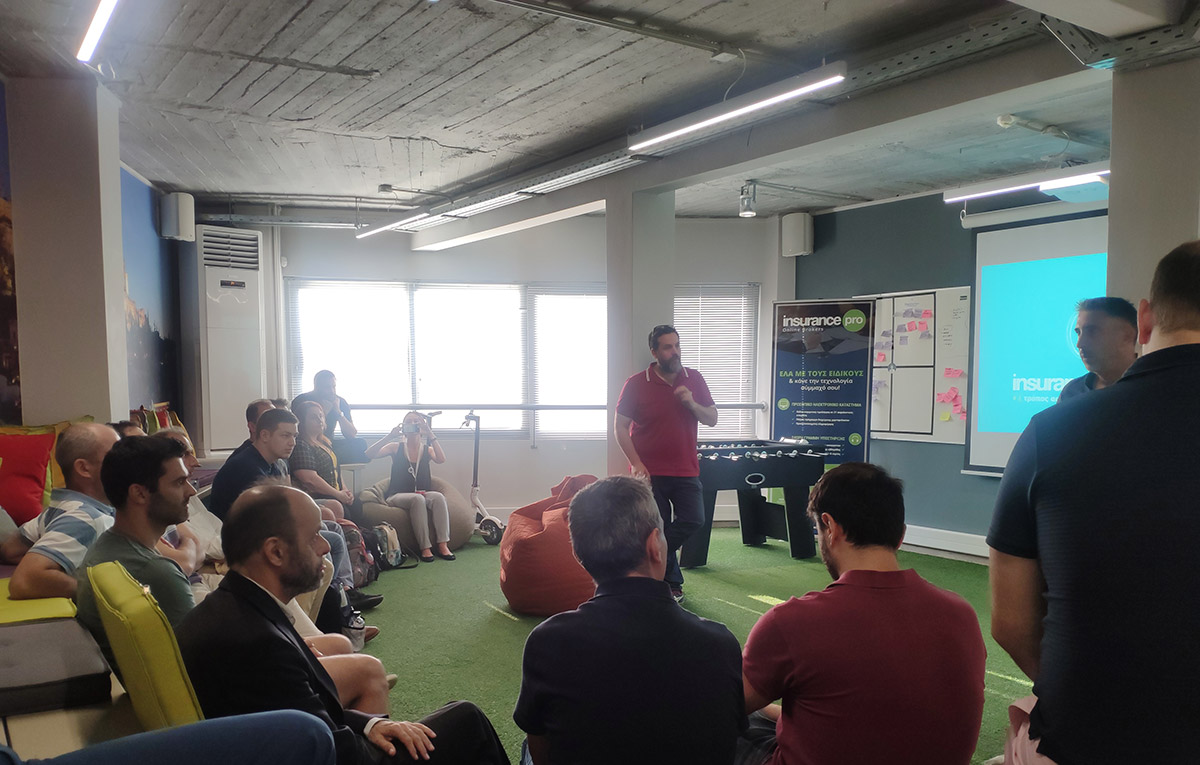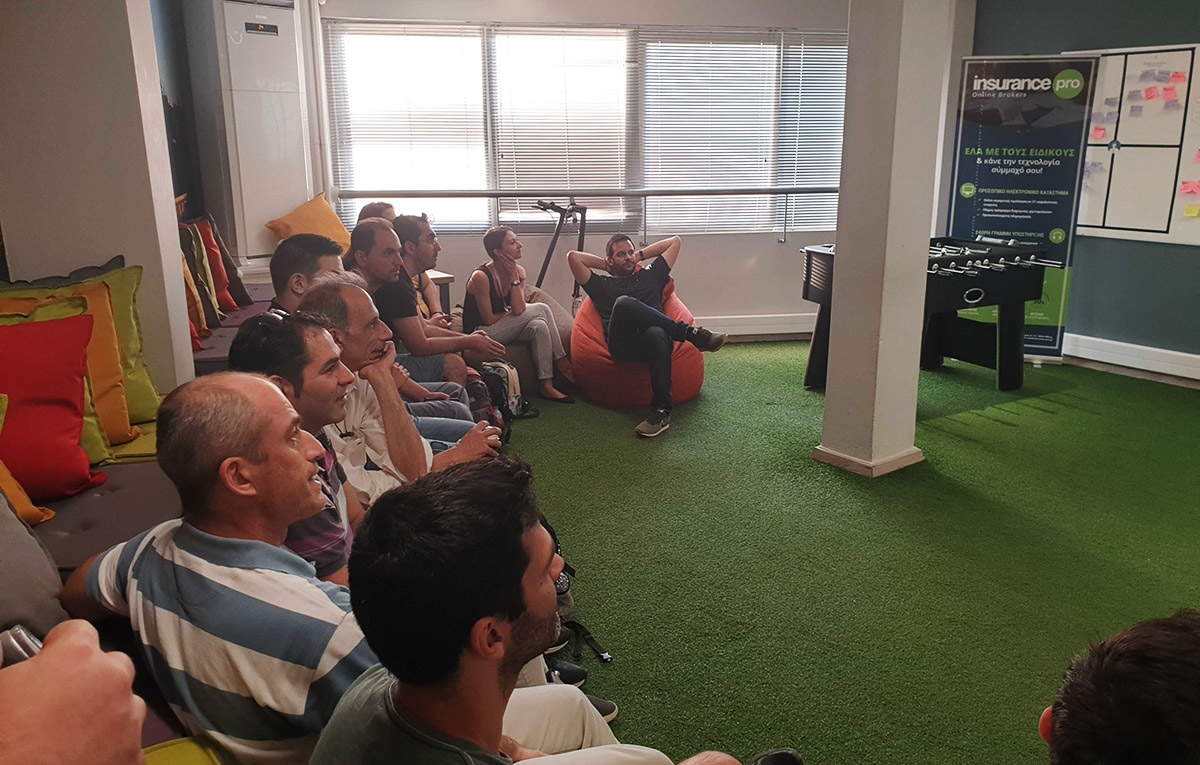The Scale Up Greece story continues…
To scale up, or not to scale up: that is the question. No, hold on. It’s not a question at all – it’s a must if you want your startup to be successful.
If you’re running or working at a startup, the question of scaling up should hopefully be a “when”, and not an “if” issue.

But why are we going on about scaling up again? Well, forgive us for our enthusiasm but we’re still buzzing after our latest #ScaleUpGreece event which was held at Insurance Market’s Athens HQ.
Scale up stories and #ScaleUpGreece
In case you have been living under a rock. Or, just have not read our blog before, #ScaleUpGreece is our response to Greece’s status as a European startup and scale-up hub. More than that, it’s also a community for anyone who is interested in entrepreneurship and Greek startups.
After the success of our inaugural event in January, where Epignosis’ team regaled us with their own exciting scale-up success story, this time round we were hosted by Insurance Market, an inspirational startup in the FinTech arena.
And oh what fun we had! As well as some insightful learnings and lessons to take on board going forward.
Why Scale up Greece?
Before we get to the learnings and insights, our CEO and Founder Dimitris Tsingos shared his own pearls of wisdom.
“This is just the second of a series of meetups that aim to contribute to a change in the mentality that’s has been established the previous years. There’s been an obsession about fundraising and that was true especially for early stage startups. Fundraising is just a medium that will probably help you achieve your goals. But then again it’s not your actual goal. Your goal is to make a thriving company.”
After working with and studying the area of scale-ups for some time, we’ve come to realize – or validate if you wish – that funding is not a prerequisite for a company to grow. If you remember one thing, remember that.
So what did Insurance Market have to say on the matter? Here are some of the main soundbites from their insights.
What are the attributes that a make a company successful?
Is it a matter of funds? The answer is a firm no. Funding in Greece is understandably smaller in scale versus other countries. For example in the USA, fundraising rounds can deal in huge amounts of cash.
What’s interesting for us? How can someone create a successful company after a long period? i.e. a business which will grow more organically in nature, although helped by a little funding.
Who are Insurance Market?
A few words about Insurance Market. Founded in 2016, it was previously known as LiveInsurance.gr, which had began operations in 2010. Two years later, the company revamped its platform and managed to conquer the Greek insurance market.

The financial crisis in Greece was a big opportunity for the business to disrupt the existing insurance business model. And that is what they did. During this time, customers initially turned to online platforms for their car insurance contracts instead of local insurance agents in a way to save money.
And with a kind of “brutal penetration”, Insurance Market managed to become the #1 choice for direct policy selling. Today, the company is established as a pioneer in the digitalization of insurance services, as their Insurance & Energy comparison and brokerage website gets over 95% market share among online aggregators.
So, what did we learn from such scale up masters?
Scale up lessons from Insurance Market
Insurance Market’s main speaker was CEO Sotirios Papantonopoulos – Mantopoulos, and he and his team had plenty of valuable insights to hand out.
First, the question on fundraising: On whether you need to “prove” yourself to investors by showing your growth or huge customer base or not. And of course their answer was direct: Definitely not!
As S. Papantonopoulos explained: “It’s true that there’s been a false notion a few years ago that you had show your company’s growth or a huge customer base in order to attract investors. But things are changing. You need to know how you are going to invest the fund you’ll probably get in order become profitable. i.e. in which particular aspect of your business you’re going to leverage that fund in order to move forward.”
On agreements with investors
When investors enter the game there is always the danger of losing your company. If things go well your investors will “lose”, if things go wrong you might end up losing your company. For this reason you have to be cash flow positive at the end of your funding before you go for another fundraising round.
That’s what Insurance Market does. As they confessed to us they focus all of their management efforts on that target. They do everything they can to have a cash flow positive company.
On the importance of UX
“We were a small team when we started with our first site, liveinsurance.gr, back in 2010. We didn’t have any money and we spent a whole year preparing it, making sure that we meet all UX requirements, etc. And in the end we found out that it was all a waste. Our learnings forced us to kind of pivot and change our site completely.
After checking our competitors’ websites and applying learnings from them to our new website, our conversion rates went from 0.5 to 2.5. The reason? We streamlined the user experience (UX) and cut out a lot of superfluous information. And we also changed the order of information displayed to focus on the main pain points that a customer may have.”
At the end of the day, when someone visits your website or your app, they need to get to the juicy part right away and spend less precious energy in understanding how your product or service works. If not, they will abandon you and turn to one of your competitors who make things easier for them. I’d say that innovation and creativity may actually be harmful in this context.
Set the foundation of your workflows
Make sure that you focus on your workflows right from the beginning.
“We drew up a complete structure of all of our procedures, setting the ground for our future needs. Right after that we started doubling our earnings month-on-month. There were still some competitors (around 5-6) who were bigger than us, but we managed to overtake them.“
On the rapid development rate and external factors
“This can be explained with our really good product-market fit, the new UX, and of course our great close-knit team.
And there’s also something else. Timing. You may have a really good product ready but there will be no progress for a long time and then suddenly things change. It’s because of circumstances. It’s like a wave that comes your way and you have to be prepared and paddle as hard as you can to ride it. This is what happened to us as a scale up.
Sometimes there’s an upsurge in the trade/market, one you cannot predict. Our profits kept doubling month by month. It was a really demanding period but an exciting one. We used to stay at the office until late at night to register all of our customers’ contracts. That’s when our initial 14-member team grew to 40 in just a few months. Things then kind of stabilized, that growth rate fell but we stayed stable. The reason? Well, the financial crisis in Greece that shook up the insurance market. And again these are external factors which you cannot have any control over.”
And now some key points to consider.
Q: As an CEO of a startup or scale up do you actually need to build your marketing skills? Is it necessary or at least helpful?
A: “I learned all about marketing to apply it within the company. I devoted precious time to it and I think all founders should.”, said S. Papantonopoulos. “You’ve got to know your business inside out. In this way, you can go straight to your customers as you know their needs.”
“Get direct feedback yourself, as your sales agent may filter their feedback and you may miss part of the precious information.”
To learn is to scale up
You need to be kind of obsessed with learning. That’s how you’ll grow your business. No business development manager/director/analyst or whatever job title you prefer, will ever be enough to skyrocket your business. You have to do it on your own. You’ll get precious tiny details that will help you take your business a step further.
You’ll need to understand why your customers’ reject your product. Once you do this, then you’ll be able to use it to your business’ benefit and you’ll be able to offer relevant training to your employees.
The customer experience journey is everything
Read all of your customers’ complaints and emails. Make your priority to reply to all of them.
From Insurance Market’s perspective: “Customer service and experience is above everything. We have set up a procedure to transfer that feedback to all of our teams. Pains and complaints are recorded and used as a guide for further improvements.“
“We’re also proud that we have a really high NPS (net promoter score) which is a stable 75-80% all these years. It shows the willingness of customers to recommend the company’s services to others.”
Training and hiring
Offer quality training to your employees. Not just for business success but also for motivation.
And that’s exactly what Insurance Market does.
“We set up our own training school for employees’ on-boarding process. Our motto is “Don’t look for the right people for your team. Create them.”
On teamwork
Q: What motivates people? Is it money (salary, promotion), or is it a matter of relationships? And what makes a team stay together and thrive?
A: “You’ve to got to love what you do!”, says S. Papantonopoulos. “I’d say that it’s not that easy to achieve this. It’s a matter of culture. But we don’t have just one single company culture. There’s several micro-cultures within our company. And it actually took us some time to shape them. At least that’s how we see it.
Each team has its own micro-culture. Take, for example our IT team. They are a group of people that have their own way of thinking. You cannot intervene in their internal workings. The team and their manager know better what it’s important for them.”
Core values
- Transparency: a major core value that you need to have in order to keep your team together and thrive together.
- Employee growth: make your employees feel that the time they spend in your company is not wasted. That they create value, they’ve built something at the end of the day.
Make the best out of our employees’ skills. - Recognition in bonuses, cooperation, appreciation and in salary is also important.
“Development is the first thing we promise to our new employees and we actually make it real. We encourage learning, we promote internal mobility and we also give our employees opportunities to participate in new things.” , shared with us the head team of Insurance Market.
And finally, learn as you grow
As you grow and scale up, you may feel that you’re losing control over your resources, your people, etc. And that’s exactly when you need to regroup and learn from new ideas. You need to take these ideas, reshape them and incorporate them in your company.
It’s also important to learn to let go of things as you grow and make the transition from wearing multiple hats to having a single well-defined role.
“You need to take a step back and give responsibilities to new people coming in to your team. Trust and give opportunities to new hires. This can be challenging but ultimately will take you to the next level.”

Clearly, Insurance Market’s scale up success is an interesting one. Onwards and upwards is the only way from here. After all, if there is a common vision in place and you are planning ahead properly – together – the sky is literally the limit.
